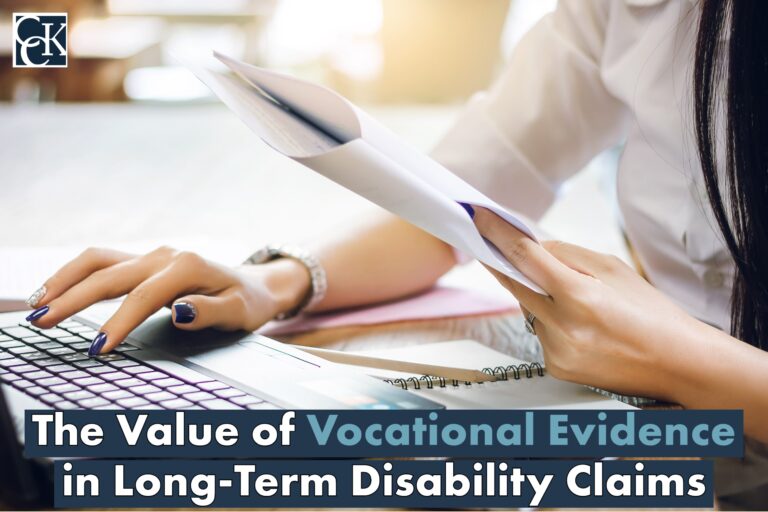The Value of Vocational Evidence in Long-Term Disability Claims

When filing for long-term disability (LTD) benefits, the burden of proof is upon the claimant. Thus, it is the responsibility of the LTD claimant to submit evidence that proves that their condition meets the definition of disability within their policy.
Many claimants focus on the medical evidence they must supply, but the value of vocational evidence in long-term disability claims cannot be understated. Such evidence is vital in providing the insurance company with a full picture of how your disability impairs you.
This article will discuss what long-term disability claimants must know about vocational evidence and why it matters for their disability claim.
What is Vocational Evidence?
The term “vocational evidence” covers a wide variety of information in the context of long-term disability benefit claims. It includes things such as your education and training; your work history; your earnings history; the physical and cognitive duties of the job you were performing when you became disabled; job skills you have obtained; job descriptions; labor market surveys; and reports from vocational experts.

Vocational evidence can be helpful for both group policies governed by ERISA and individual policies that claimants have bought privately.
Medical Evidence
Often when discussing long-term disability claims, the focus is on the medical aspect of these claims and what the medical evidence needs to show, such as what your medical conditions are; what your resulting symptoms are; and what restrictions and limitations those symptoms cause you.
Although the medical aspect of long-term disability claims is extremely important, equally as important is the vocational aspect and the supporting vocational evidence.
Why Does Vocational Evidence Matter?
Vocational evidence matters because of the way disability is traditionally defined in long-term disability policies. There are typically two definitions of disability that appear in LTD policies, although the specific language used can vary: the “own occupation” definition of disability and the “any occupation” definition.

Many policies, especially employer-provided policies, have definitions that change from own occupation to any occupation after a certain length of time.
Understanding “Own” and “Any Occupation” Definitions of Disability
The own occupation definition of disability asks whether your medical condition renders you unable to perform the material duties of the job you were doing at the time you became disabled. This includes both physical and cognitive duties.
Own occupation definitions of disability typically focus on how your job is performed in the national economy, not how it is performed for your specific employer.

The any occupation definition of disability asks whether your medical condition renders you unable to perform the material duties of any job. Often, the any occupation definition is limited to occupations you are qualified for based on your education, training, or experience.
Some any occupation definitions of disability also ask whether you are unable to perform the material duties of a gainful occupation, which is an occupation that allows you to earn a certain percentage (typically 60 to 80 percent) of your pre-disability earnings.
As these definitions of disability make clear, it may not be enough that you have a medical condition that results in some functional impairments. Your impairments must prevent you from performing the duties of either your own or any occupation, depending on the applicable definition of disability.
To determine whether your medical condition prevents you from performing the duties of your own occupation, you need to understand what those duties are. Understanding what other occupations you may be capable of performing is crucial. You must understand what these other occupations are and what their duties consist of, especially considering your own education, work history, and overall skillset.
This is where vocational evidence comes into play. Once you understand what the duties of your own, or any, occupation are, you can then compare your impairments to those duties and determine whether you meet the applicable definition of disability.
How Vocational Evidence Impacts Claims Under the Own Occupation Definition of Disability
When an insurance company is evaluating your claim under the “own occupation” definition of disability, vocational evidence is necessary to ascertain what your own occupation was and what duties it required. Often, your job title by itself does not tell the full story of what your occupation required as there can be many variations within the same job title.

For example, if you look up “Director of Nursing” in the Dictionary of Occupational Titles, it states that it is a sedentary occupation. But while a claimant’s job title may be “Director of Nursing” at a hospital, they may be responsible for both the supervision of other nurses and the direct treatment of patients.
Thus, despite their title, they do not have a sedentary occupation. While it is true that many definitions of disability focus on how your job is performed in the national economy, rather than how it is performed for your specific employer, insurance companies cannot simply ignore a major portion of your job duties simply because they do not match your formal job title.
For careers in the medical field, board certification or specialty should be considered when determining what a claimant’s own occupation is.
While all may state that they work as doctors, the duties of an internal medicine physician are much different than the duties of an OB/GYN, whose duties are much different than those of a radiologist.
There can also be wide variation even within the same medical specialty. Both a surgeon and an in-office physician may list their occupation as “orthopedic doctor,” but the material duties of their occupation will be vastly different.
Vast Differences in Occupational Duties Necessitate Vocational Evidence
As is evident, there are vast differences in occupational duties for the same job title. Staying with the example of a doctor, what disables one type of doctor may not disable another. Thus, vocational evidence is important.
For example, an emergency room physician may no longer be able to tolerate the high stress and pressure of their position. Yet the same may not be true for an internist who sees regularly scheduled patients for routine care in an office setting.
Alternatively, if a surgeon loses the ability to perform fine manipulation with their hands, then they may no longer be able to operate. In such a scenario, the surgeon is disabled from their own occupation.
For physicians, information about board certifications, CPT code reports, and job descriptions can all be extremely important in explaining their own occupations and identifying their duties.
A further example is a lawyer. Lawyers do not have certifications per see, but, similar to physicians, the type of law practiced by a lawyer is an important consideration when determining what their own occupation is.
For example, a trial lawyer who must appear in court every week has much different job demands than a trusts and estates attorney who primarily drafts documents in an office.
How Vocational Evidence Impacts Claims Under the “Any Occupation” Definition of Disability
When an insurance company is evaluating your claim under the any occupation definition of disability, vocational evidence is often necessary. Vocational evidence helps you ascertain what transferable job skills you have and thus what other occupations you could vocationally perform.

Insurance companies often will argue that if you are physically and mentally capable of performing some type of work, then you are no longer entitled to LTD benefits. However, such companies fail to consider whether you are capable of performing that work vocationally.
Evidence regarding your education, your training, your prior occupations, and your prior earnings, will all inform whether you are vocationally capable of performing other work.
Educational Background Can Show You Cannot Perform Other Work
For example, we often see insurance companies assume that anyone who can perform sedentary work can work in an office. But that is not necessarily the case.
If a claimant has limited education and worked in manual labor occupations, such as construction, for their entire career, they may not have the transferable skills necessary to perform office work.
If you can only perform sedentary-level work, but you do not have the vocational skills necessary to perform that work, then you may still be entitled to long-term disability benefits under the any occupation definition of disability, even though you are physically capable of working.
The Gainful Component and Vocational Evidence
If your long-term disability policy contains a gainful component then you must ensure that:
- You are capable of performing another position, and
- You must be able to perform another occupation that will earn you a certain percentage of your pre-disability earnings.
A gainful component can make the any occupation definition of disability easier to meet. If you worked in a high-paying job prior to disability, then the gainful component will likely correspond to a high salary. A higher salary frequently corresponds to a more demanding job.
Even mild restrictions and limitations can prevent you from performing the duties of a demanding job. Thus, you may be able to perform a multitude of other occupations, but if none of them meet the salary required by the gainful component, then you may still be entitled to LTD benefits under the any occupation definition of disability.
Some Claimants May Not Be Able to Earn the Median Pay for Another Occupation
The gainful component usually means that the claimant must be capable of earning that amount if they were to return to work in another occupation today.
Yet when determining whether another occupation meets the any occupation gainful component, insurance companies often look only at the median earnings for that occupation, without considering whether the claimant would actually be able to earn that amount.
You may be medically and vocationally capable of performing another occupation, but your transferable skills mean that you are only capable of performing it at entry-level. Thus, you likely would not earn the median salary for that position, but rather a much lower amount.
Further, if you are not vocationally skilled enough to perform an occupation that could potentially meet the gainful component, you may still be entitled to disability benefits under an any occupation definition.
What Do I Do If My Long-Term Disability Claim Has Been Denied?
Unfortunately, insurance companies often focus only on the medical aspect of disability claims and put little weight on the vocational aspect. They may consider only your job title in determining the duties of your own occupation, rather than what your occupation actually required.

Alternatively, the insurance company may assume that someone who can perform sedentary work is automatically able to perform any occupation and thus no longer entitled to benefits.
The attorneys and professionals at Chisholm Chisholm & Kilpatrick are experienced in analyzing vocational issues in long-term disability claims and identifying errors the insurance company may have made. We also work with vocational experts who can analyze vocational evidence and determine what your own occupation was and what other occupations you may be qualified to perform.
You have the right to appeal an insurance company’s denial of your claim. It may seem like an overwhelming task, but it is not one you must do on your own. Our dedicated team can handle every aspect of your long-term disability appeal for you so that you can focus on your health.
Call CCK Today for a Free Case Evaluation
If your long-term disability claim has been denied or terminated, you have the right to appeal that decision. The appeal stage is often the best time to consider contacting a long-term disability lawyer because it could be your last opportunity to get evidence into the record.
If you need help with your LTD claim, CCK can help. Call us today at (800) 544-9144 for a free case evaluation. A member of our team will analyze your case and determine whether we are able to assist you.
About the Author
Share this Post

